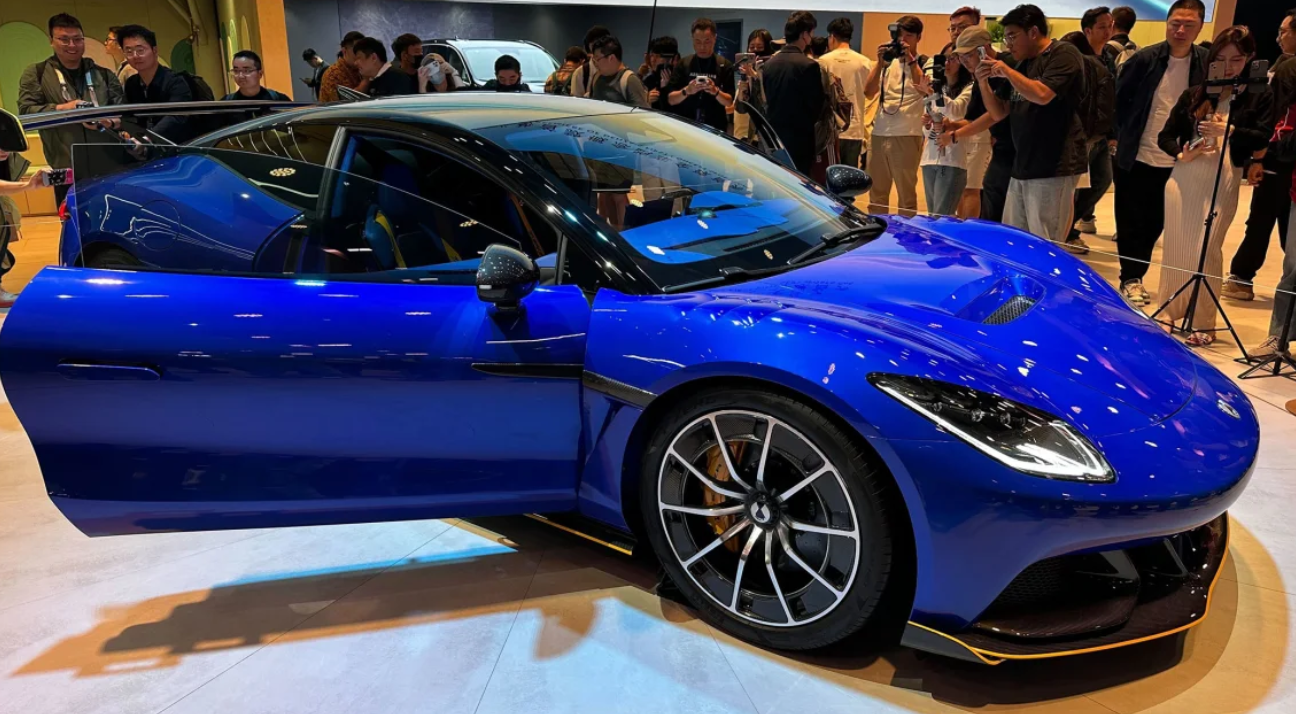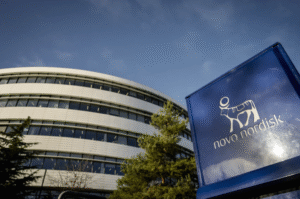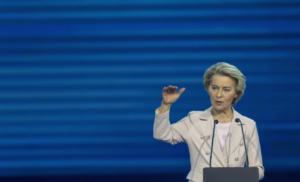Chinese electric vehicle giant BYD has overtaken Tesla in global sales of electrified vehicles and is now setting its sights on luxury sports cars. The company’s premium Denza line recently revealed the Z, a sleek, deep-blue model designed to compete with high-end Western brands like Porsche and Mercedes-Benz.
The unveiling took place at Auto Shanghai, China’s largest auto show, where both domestic and international carmakers showcased their latest innovations. The event, which drew numerous journalists and industry experts, highlighted the rapid growth and technological advancements in China’s electric vehicle sector. This development has raised eyebrows internationally, especially in light of China’s rising dominance in the global EV market.
BYD has established itself as the leader in China’s electric vehicle market, having surpassed Tesla in global sales last year. The company continues to outpace its American competitor in its home market, where the majority of its vehicles are sold. While Tesla has been grappling with financial struggles, including a significant drop in revenue, BYD remains a key player in China’s EV landscape.
The Denza Z has been highly anticipated, especially after images of the prototype leaked earlier this year. The model is expected to be packed with advanced technology and luxury features, making it a direct competitor to established brands. Originally launched as a joint venture with Mercedes, the Denza brand is now fully owned by BYD and recently expanded into Europe.
While BYD is known for its affordable electric and hybrid vehicles under its core brand, the Denza line marks the company’s push into the luxury segment. Analysts suggest that BYD’s aggressive strategy, including frequent vehicle launches and competitive pricing, allows it to disrupt the market and outmaneuver rivals. Tu Le, founder of Sino Auto Insights, noted that BYD’s cost-effective approach gives them a distinct advantage, allowing them to undercut competitors while maintaining high-quality offerings.
The Denza Z launch coincides with a tough period for Porsche, which has seen a significant decline in sales in China. In its 2024 report, Porsche acknowledged a 28% drop in sales, citing the ongoing economic challenges in the country.
While the pricing details of the Denza Z have not yet been disclosed, BYD’s luxury models, like the N9 flagship SUV, start at around 389,800 yuan ($53,453). In comparison, the more affordable Song Plus SUV starts at approximately $18,500. BYD also sells luxury EVs under the Yangwang brand, which recently reached the milestone of selling its 10,000th vehicle. The latest model in this lineup, the U8L SUV, was also launched at Auto Shanghai.
This growing portfolio of luxury vehicles highlights BYD’s ambition to compete with some of the biggest names in the automotive industry, setting the stage for a new chapter in the electric vehicle market.
BYD continues its ascent
The recent launches from BYD come after an already remarkable year for the Shenzhen-based automaker. As China’s top carmaker, BYD has set an ambitious goal to double its sales outside China to over 800,000 vehicles by 2025.
BYD plans to maintain its cost advantage by assembling vehicles locally in different markets, according to the company’s chairman, who shared this in an earnings call last month. However, the company faces challenges in international markets. Last year, the European Union imposed significant tariffs on electric vehicle (EV) imports from China, citing unfair subsidies in the Chinese market. In addition, a 100% tariff imposed by the Biden administration last year effectively blocked Chinese EV manufacturers from entering the US market, even before the current trade tensions between Washington and Beijing escalated.
Despite these hurdles, BYD has made significant strides. The company accounted for about one-third of China’s electrified vehicle sales, including hybrids, last year. In February, BYD launched the “God’s Eye,” an advanced driver-assistance system (ADAS) that competes with Tesla’s Full Self-Driving feature, available at no extra cost for most of its cars in China. Additionally, last month, BYD introduced a new battery charging technology that can add 250 miles of range in just five minutes, outperforming Tesla’s Supercharger network, which takes 15 minutes to add 200 miles of range.
However, the competitiveness of the Chinese market was further highlighted this week when Contemporary Amperex Technology (CATL), the world’s largest EV battery producer, unveiled an upgraded battery that promises an even longer range of 320 miles, surpassing BYD’s cutting-edge technology.
BYD reported a 60% increase in sales for the first quarter of this year, delivering over one million new-energy vehicles in the first three months of 2025. This includes battery-powered cars, hybrids, and commercial vehicles. In 2024, BYD generated $107 billion in sales, a 29% increase from the previous year, on deliveries of 4.27 million cars, including hybrids. In comparison, Tesla reported $97.7 billion in revenue and delivered 1.79 million fully electric vehicles. Tesla’s deliveries declined by 1.1% in 2024, marking the first drop in its annual shipments.
Tesla’s market share in China stands at 6.1%, according to the China Passenger Car Association. While Tesla focuses exclusively on fully electric vehicles, BYD produces both battery-powered cars and hybrids, with the company’s EV shipments just short of Tesla’s in terms of volume.














